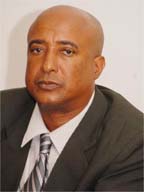– CAIC president
The private sector is disheartened that entry into member states is still at the whims and fancies of immigration officers, therefore much work needs to be done in the area of free movement of skills, says Caribbean Associa-tion of Industry and Commerce (CAIC) President Carol Evelyn.

Addressing the Convocation on the CARICOM Single Market and Economy held from October 9-10 at the Accra Beach Hotel in Christ Church, Barbados, Evelyn noted that officers are yet to be trained and sensitized to the implementation of the regional approach to free movement of people and the hassle free movement of CARICOM nationals, a release from the CARICOM Secretariat at Turkeyen stated.
As a result, he noted, entrepreneurs still find it easier to enter a territory under the guise of vacation, despite the introduction of skills certificates.
Needless to say, Evelyn added, the movement of people is a critical factor to regional private sector advancement and ultimately economic development.
“The private sector cannot effectively compete with extra-regional firms if we are unable to recruit the best skills and talents from within the region through the CSME, or to move freely throughout the region to provide services,” the CAIC president asserted.
Underscoring the view of President of the Trinidad and Tobago Coalition of Services Industries, Lawrence Placide who told the recently held regional symposium on Services in Antigua that the private sector was becoming disenchanted at the slow implementation of the CSME, Evelyn remarked that Placide had spoken for all of them.
Missed CSME deadlines
And pointing out that many of the deadlines for CSME implementation had been missed, Evelyn said that the private sector was therefore “calling for urgent attention and focus to be directed to those areas of implementation which must be addressed immediately.”
In addition, the CAIC president stated, the private sector is also calling for the urgent implementation of the movement of capital.
Highlighting the view of Douglas Orane, CEO of Grace Kennedy Limited who told the CAIC’s 4th Annual Private Sector Meeting in June that there is not enough capital in the region to meet the aspirations of the people, Evelyn argued that having free movement of capital in order to create economic development is in keeping with improving the standard of living of the people.
“The capital constraints of the private sector, and especially the services sector, also make it necessary for the CSME to facilitate the attraction of Foreign Direct Investment (FDI),” Evelyn said. “We are confident that FDI will provide a beneficial boost to private sector development through capital inflows, technology transfer, as well as other benefits,” the CAIC president noted.
Regional Stock Exchange
He also issued a call for the establishment of a Regional Stock Exchange and a regulatory framework in order to make the markets truly efficient to raise capital and function as one economic space.
Evelyn then suggested that the region should aggressively pursue its establishment and maintain the objectives of promoting the movement of capital across the region; increasing investment opportunities; encouraging optimum financing for regional firms, no matter where the entity resides; and increasing the attraction of the region as an area for investment.
The CAIC president said further that the private sector is looking forward to the finalization of the CARICOM Financial Services Agreement (CFSA) since they expect that the CFSA will increase the efficiency of the financial services sector across CARICOM.
“We believe that the CFSA should work toward ensuring that capital can be sourced at the lowest possible rate by a CARICOM services firm or supplier from any member state from anywhere in the Single Market. This will reduce the cost of capital and the cost of goods and services supplied by regional firms,” Evelyn contended.
And emphasizing that market information in the private sector is vital to competitiveness, Evelyn said that governmental assistance is necessary in developing the region’s capacity to gather and analyse data.
“This is necessary because currently many of our decisions are based on anecdotal evidence. We believe that our universities can be co-opted to assist the private sector in improving its ability to analyse market information and make changes to product development and marketing as needed,” Evelyn said.
He also pointed out that “now is certainly not the time for regional governments to be harbouring fickle political interest in the CSME,” and advised against the fragmentation of the regional project.
“As a region, we must put out our best efforts to create a climate in which countries are able to draw on each other’s resources – where capital, goods and skilled workers can move freely. Only then will we create a better standard of living for all and grab hold of this golden opportunity that has eluded us for the past 35 years,” the CAIC president concluded.
